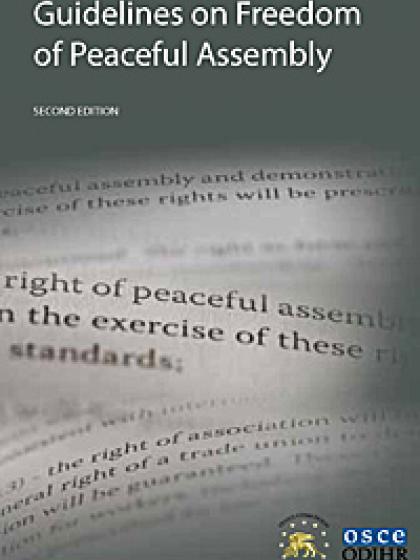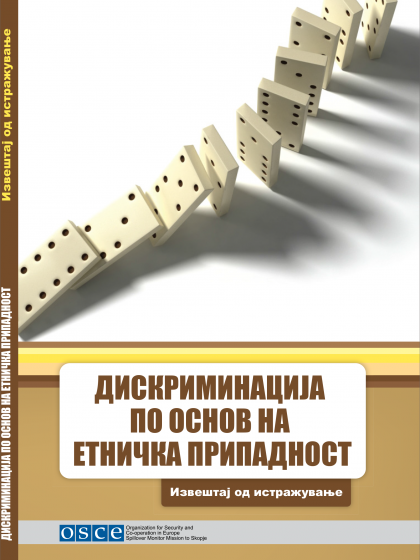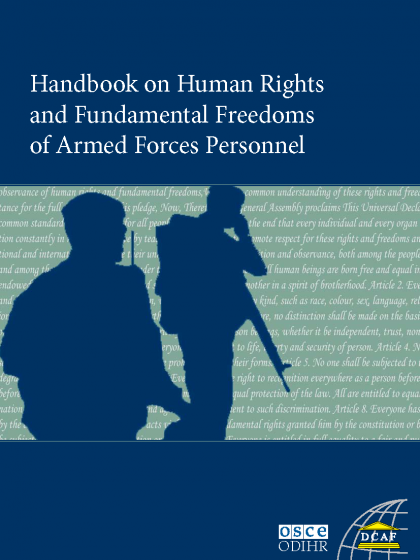Publications
Election Observation Handbook: Fifth edition
Publishing date: 21 April 2005
Content type: Guide / manual / handbook
Where we are: OSCE Office for Democratic Institutions and Human Rights
What we do: Elections
Publisher: Organization for Security and Co-operation in Europe
This handbook provides a thorough overview of the ODIHR’s observation methodology and serves as a reference work for all members of an EOM. It also informs the OSCE community at large, including governments of participating States, political parties, candidates, voters, and civil society, about the planning, deployment, and implementation of an election observation mission.
2012 Yearbook of the OSCE Representative on Freedom of the Media
Publishing date: 22 August 2013
Collections: RFoM publications in chronological order, Yearbooks of the OSCE Representative on Freedom of the Media
Content type: Annual report
Where we are: OSCE Representative on Freedom of the Media
What we do: Media freedom and development
Publisher: Organization for Security and Co-operation in Europe
This yearbook is a record of the activities undertaken by the Office of the OSCE Representative on Freedom of the Media during 2012. Preface by the 2012 OSCE Chairperson-in-Office, Eamon Gilmore; foreword by the OSCE Representative on Freedom of the Media, Dunja Mijatović.
OSCE Magazine, 1/2011
Publishing date: 15 March 2011
Collections: OSCE Magazines
Content type: Periodical / journal / magazine
Where we are: OSCE Main Website
What we do: Gender equality
Publisher: Organization for Security and Co-operation in Europe
This issue features the launch of the Lithuanian Chairmanship, a round-up of the 2010 OSCE Summit, a look at the OSCE as a security community, and more.
Guidelines on Freedom of Peaceful Assembly: Second Edition
Publishing date: 25 October 2010
Collections: Rule of Law Publications
Content type: Guide / manual / handbook
Where we are: OSCE Office for Democratic Institutions and Human Rights
What we do: Democratization, Human rights
Publisher: Organization for Security and Co-operation in Europe
The Guidelines offer a practical toolkit for legislators and practitioners responsible for implementing laws by drawing on good-practice examples from national legislations in European and OSCE participating States and the case-law of the European Court of Human Rights to illustrate the various legislative options used to regulate issues pertaining to the freedom of assembly.
Freedom of Expression on the Internet
Publishing date: 1 January 2012
Content type: Book
Where we are: OSCE Representative on Freedom of the Media
What we do: Media freedom and development
Publisher: Organization for Security and Co-operation in Europe
A study of legal provisions and practices related to freedom of expression, the free flow of information and media pluralism on the Internet in OSCE participating States.
OSCE Annual Report 2009
Publishing date: 21 April 2010
Content type: Annual report
Where we are: OSCE Secretary General, OSCE Secretariat
Publisher: Organization for Security and Co-operation in Europe
The OSCE Annual Report provides an overview of the Organization's activities in its field operations and institutions. as well as co-operation with other international organizations.
Discrimination based on ethnicity
Publishing date: 1 December 2010
Content type: Study / report
Where we are: OSCE Mission to Skopje
What we do: Rule of law, Tolerance and non-discrimination
Publisher: Organization for Security and Co-operation in Europe
This publication looks into the state of discrimination based on ethnicity. This survey, or situational analysis, was carried out in the second half of 2010 by the Macedonian Center for International Co-operation (MCIC), at the initiative by OSCE and with the support of the Secretariat for the Implementation of the Ohrid Framework Agreement (SIOFA).
Guidelines on Freedom of Peaceful Assembly
Publishing date: 16 March 2012
Content type: Guide / manual / handbook
Where we are: OSCE Project Co-ordinator in Baku (closed)
What we do: Human rights, Rule of law
Publisher: Organization for Security and Co-operation in Europe
This document is the second, revised edition of the ODIHR-Venice Commission Guidelines on Freedom of Peaceful Assembly, which were first published in 2007. The Guidelines offer a practical toolkit for legislators and practitioners responsible for implementing laws by drawing on good-practice examples from national legislations in European and OSCE participating States and the case-law of the European Court of Human Rights to illustrate the various legislative options used to regulate issues pertaining to the freedom of assembly.
Guidelines on Political Party Regulation
Publishing date: 19 May 2011
Content type: Guide / manual / handbook
Where we are: OSCE Office for Democratic Institutions and Human Rights
What we do: Democratization, Good governance
Publisher: Organization for Security and Co-operation in Europe
These Guidelines on Political Party Regulation have been created as a tool to assist OSCE participating States and Council of Europe Member States in formulating legal frameworks that comply with OSCE commitments and other international standards in facilitating the proper establishment, development and functioning of political parties.
Handbook on Human Rights and Fundamental Freedoms of Armed Forces Personnel
Publishing date: 7 April 2008
Content type: Guide / manual / handbook
Where we are: OSCE Office for Democratic Institutions and Human Rights
Publisher: Organization for Security and Co-operation in Europe
This handbook is produced jointly by ODIHR and the Geneva Centre for the Democratic Control of the Armed Forces (DCAF). It presents an overview of legislation, policies, and mechanisms for ensuring the protection and enforcement of the human rights and fundamental freedoms of armed forces personnel.










